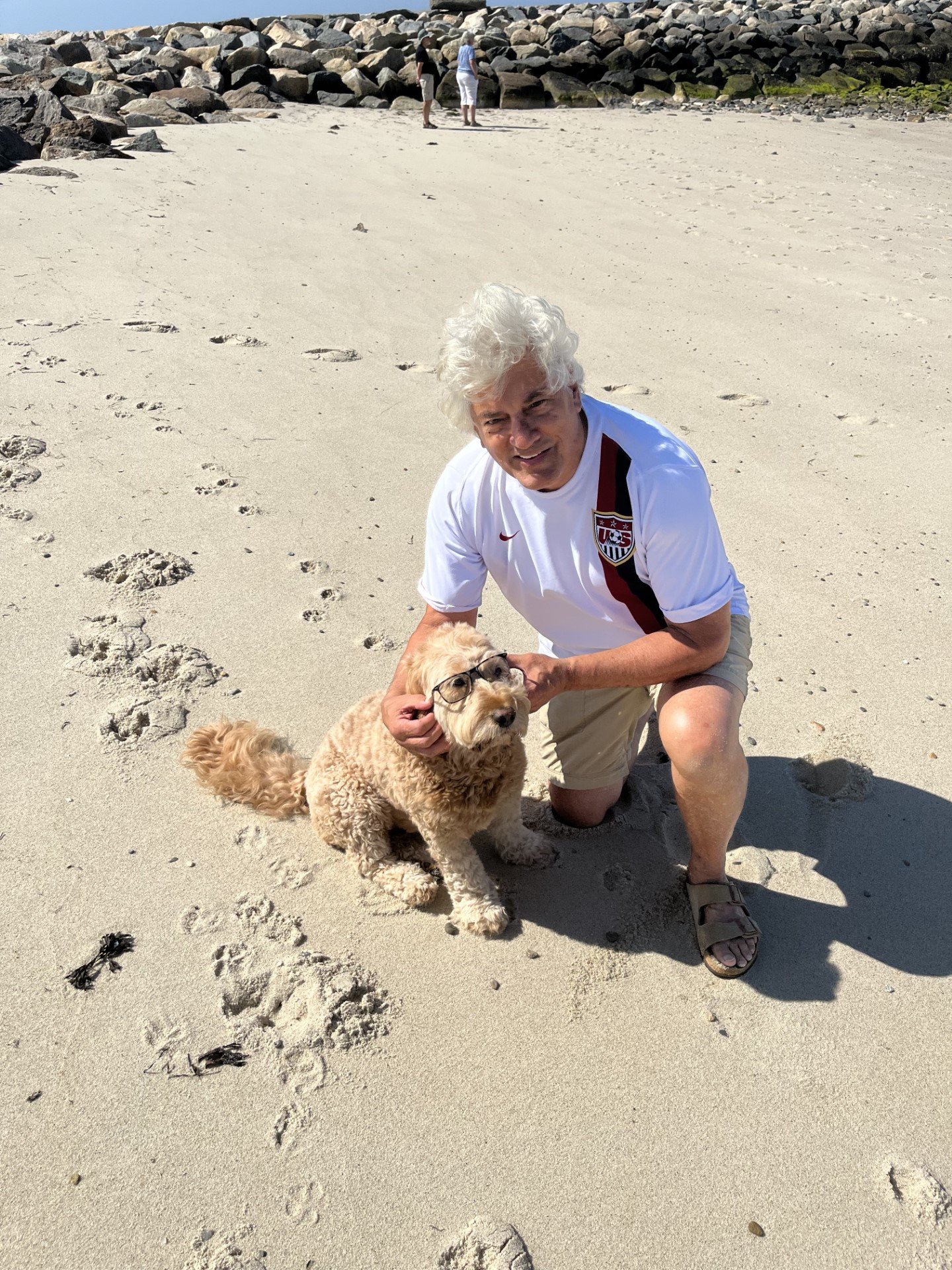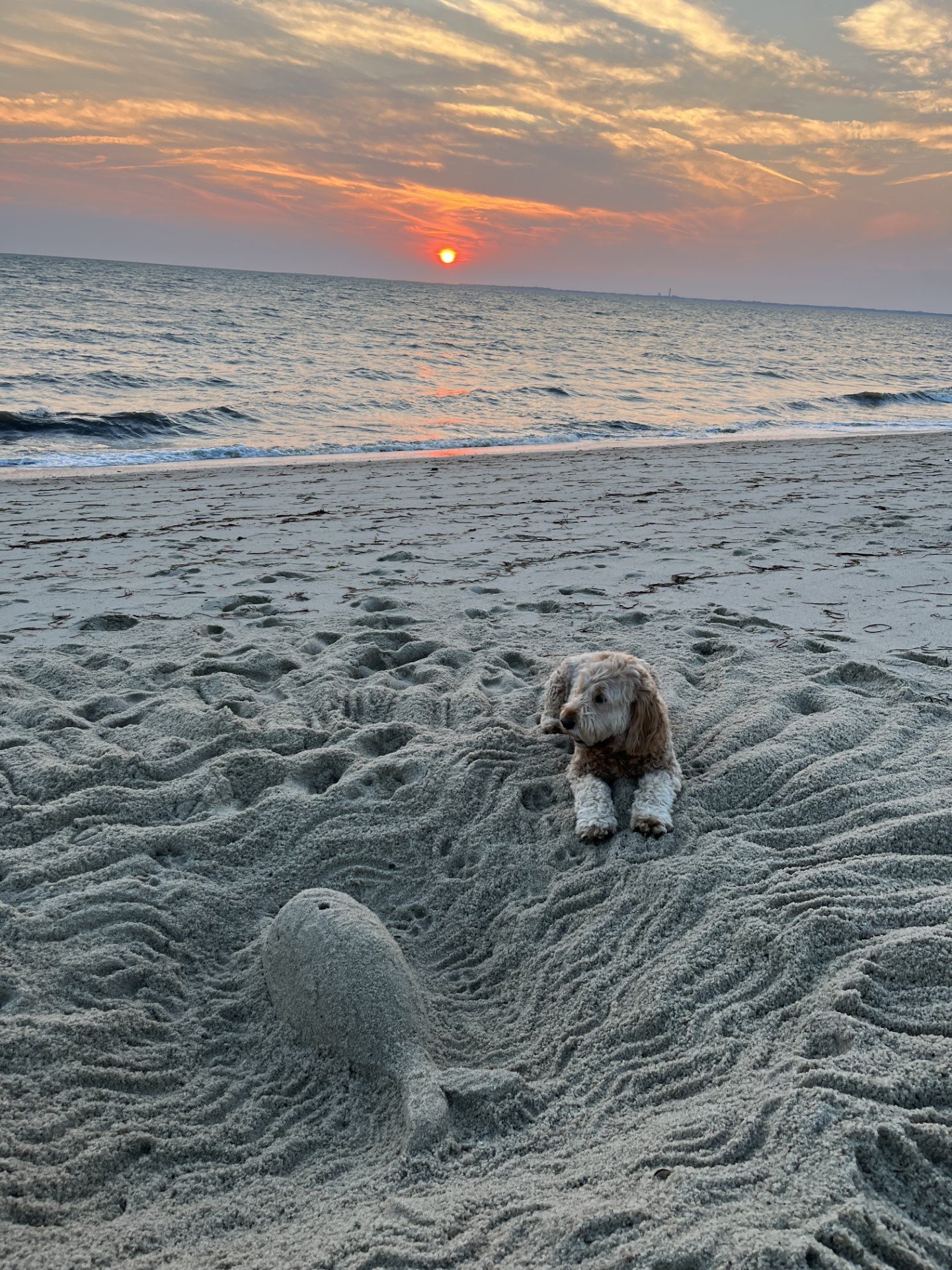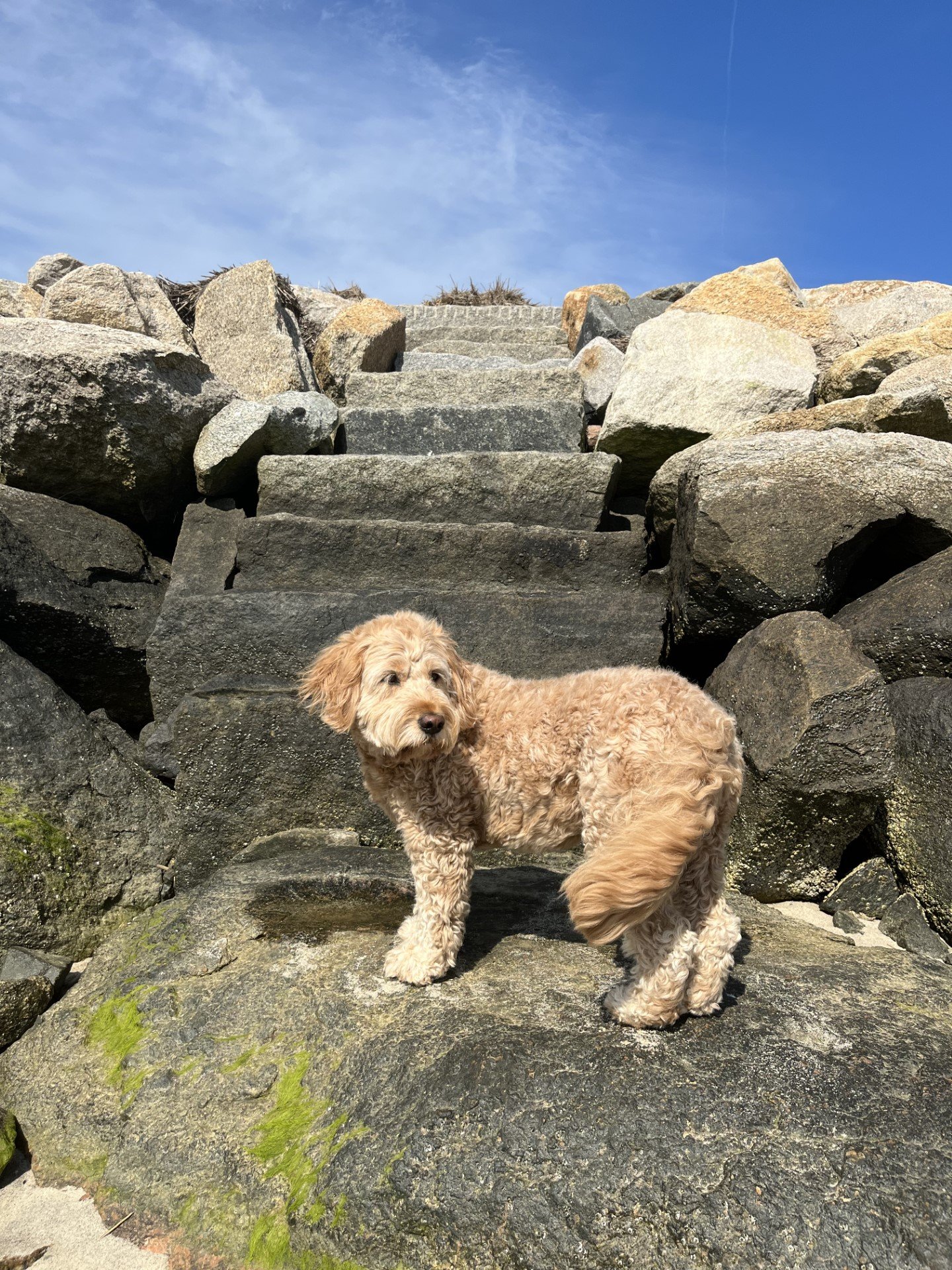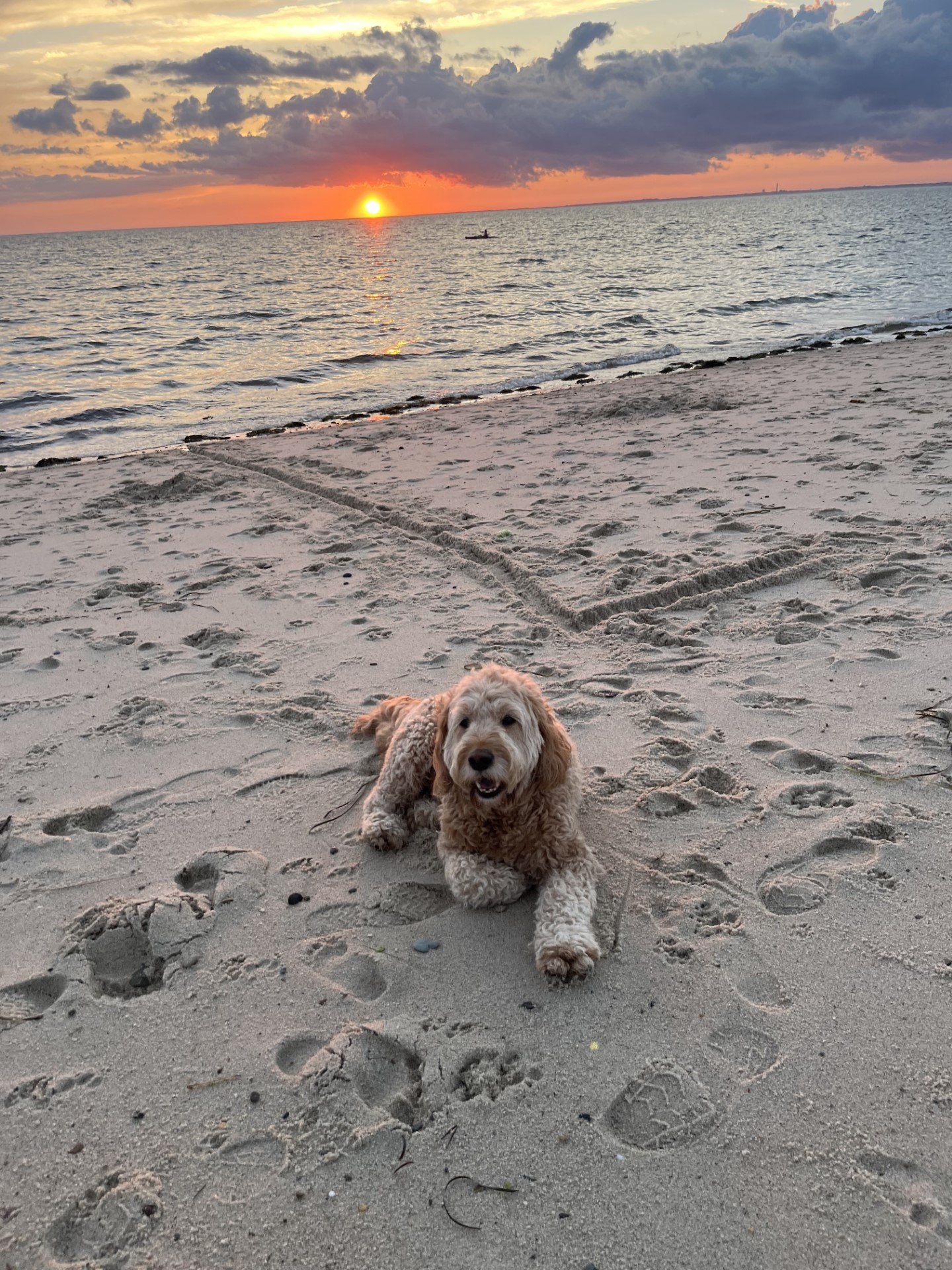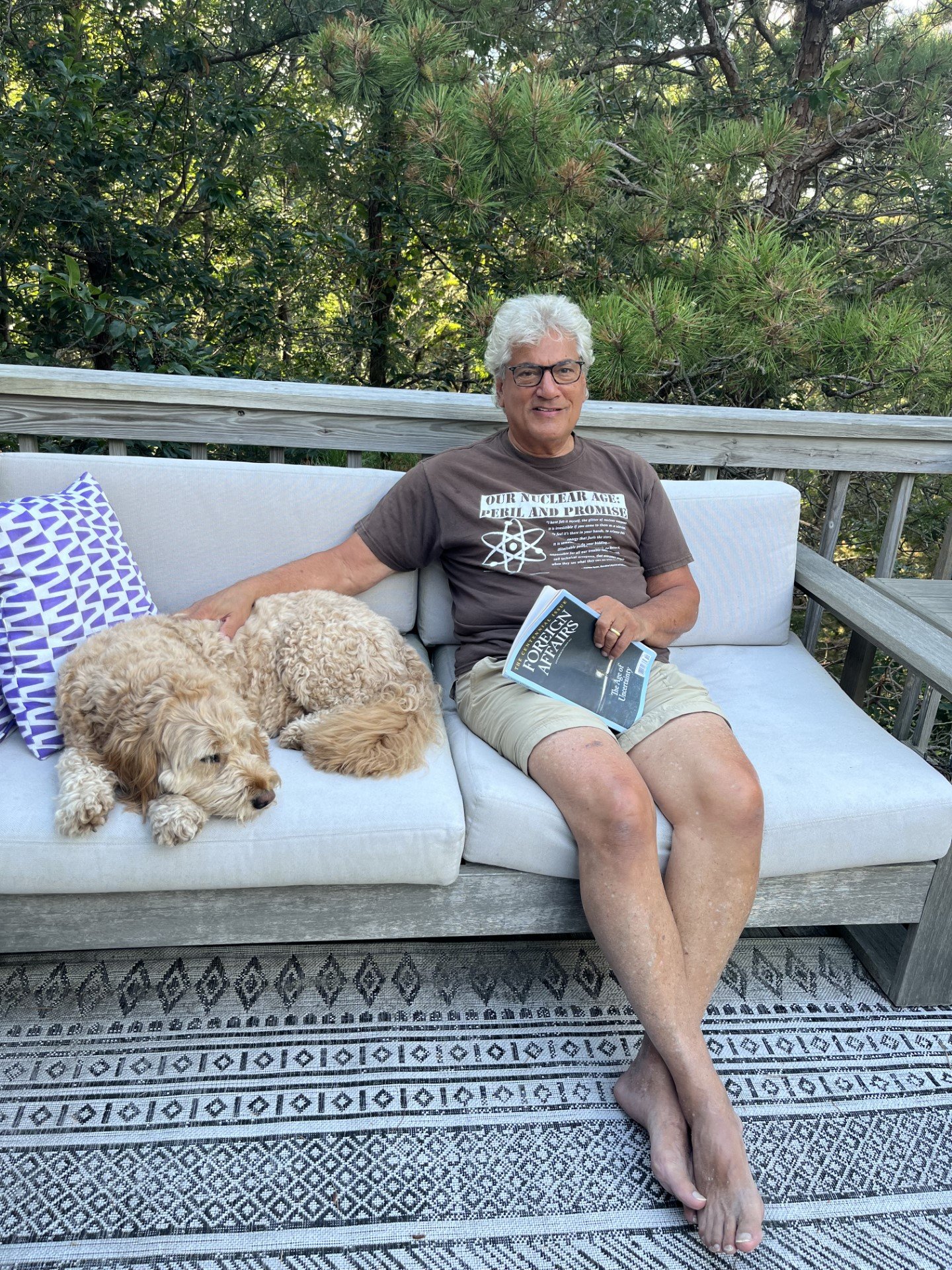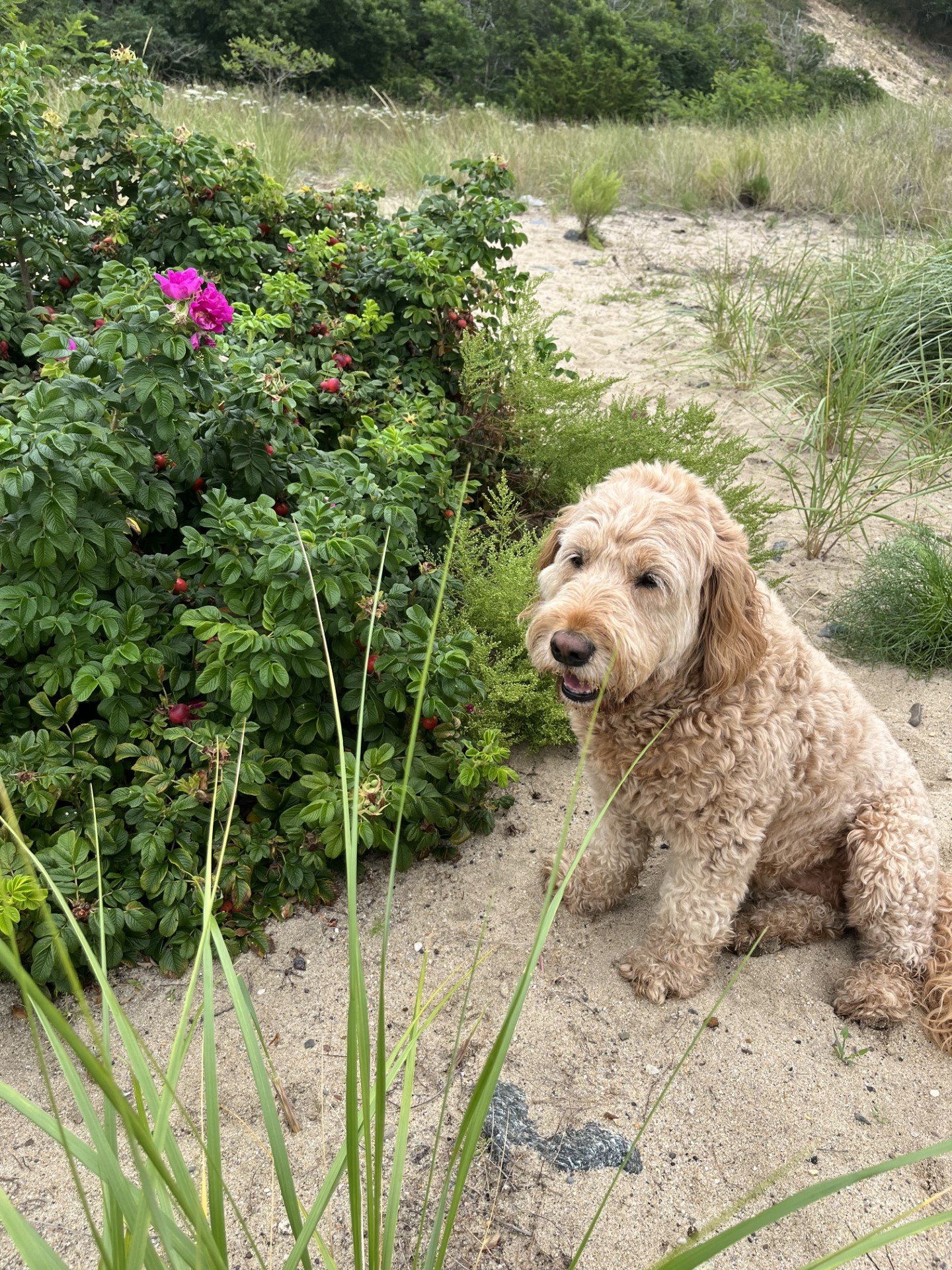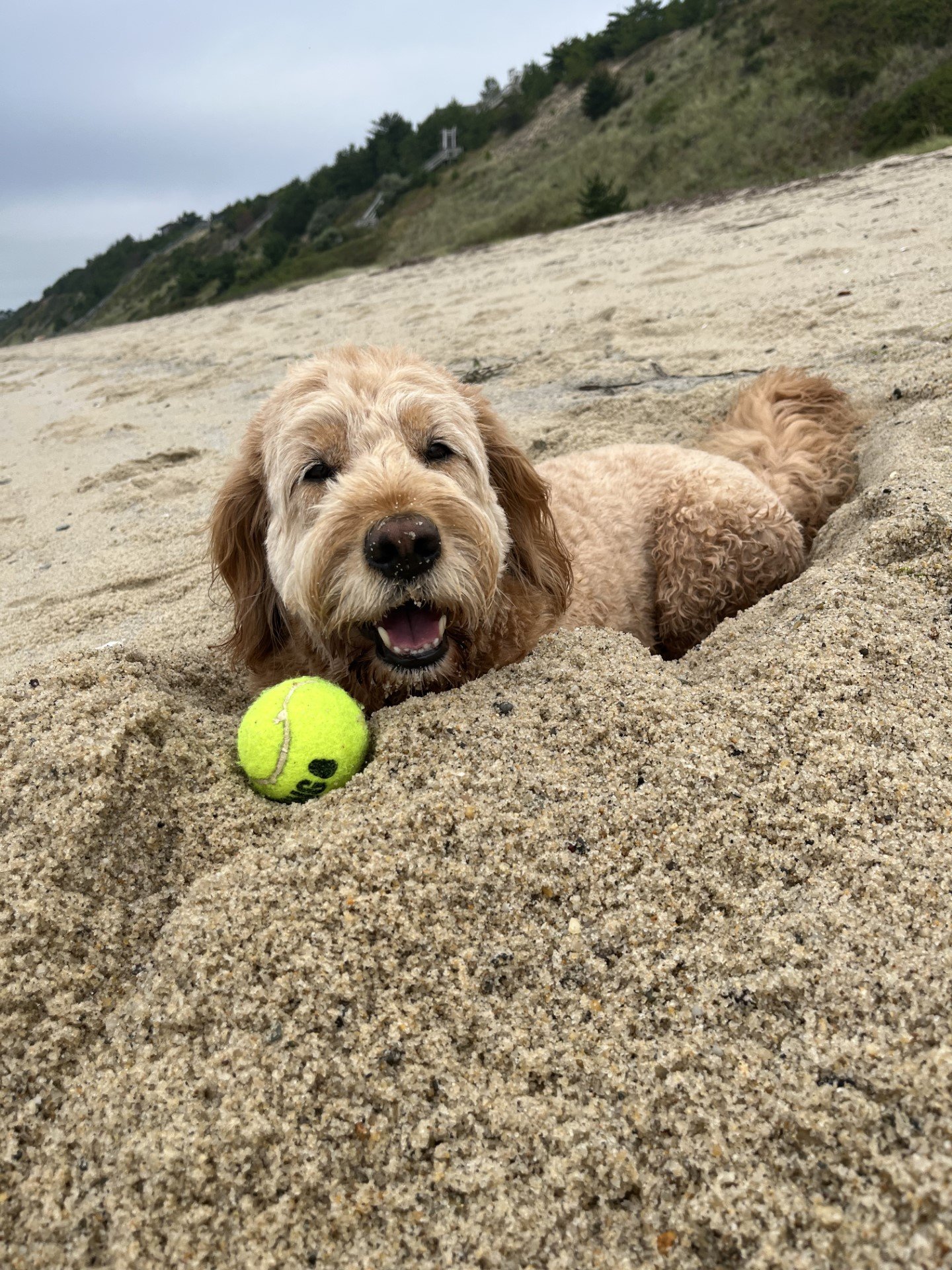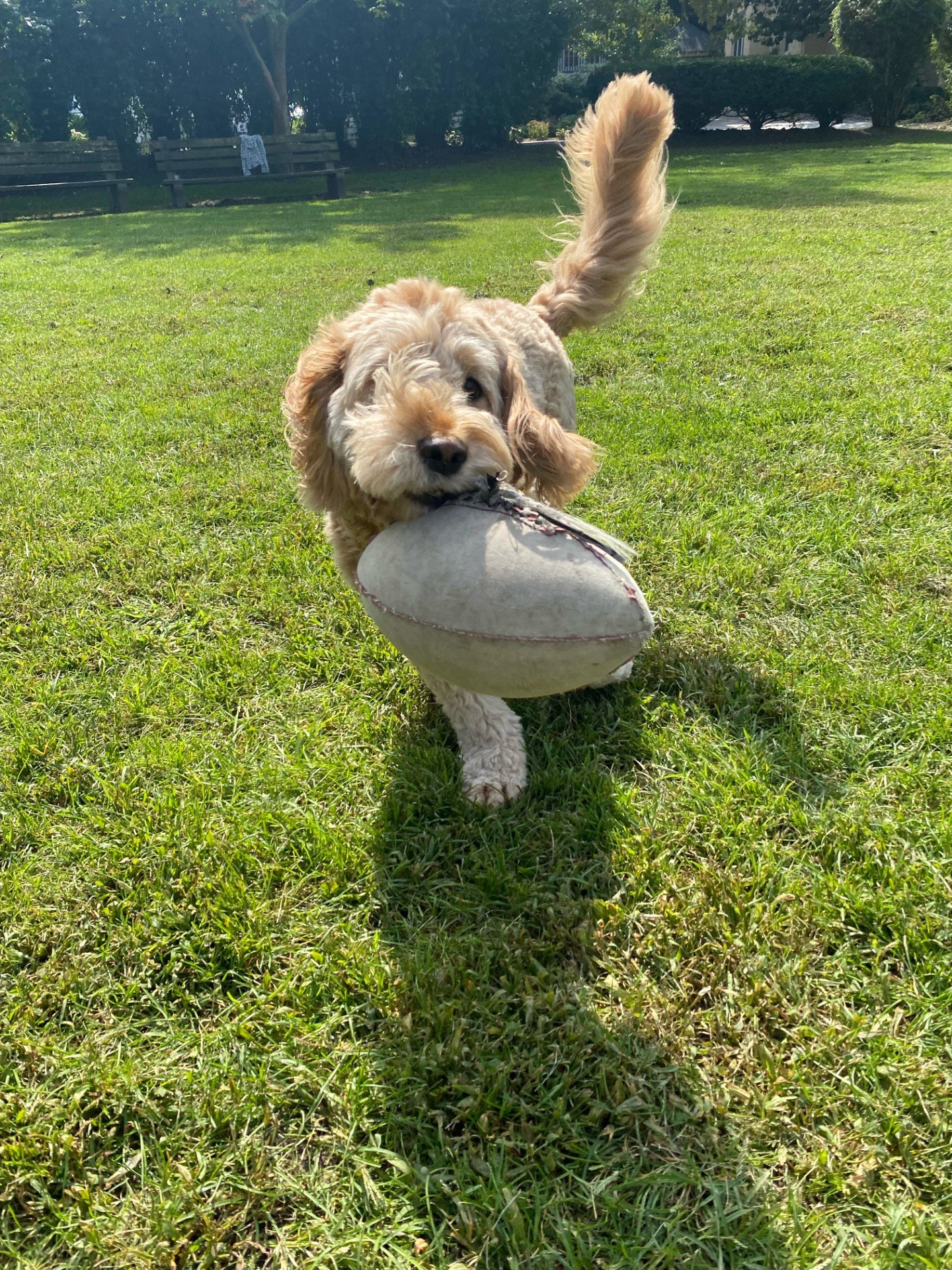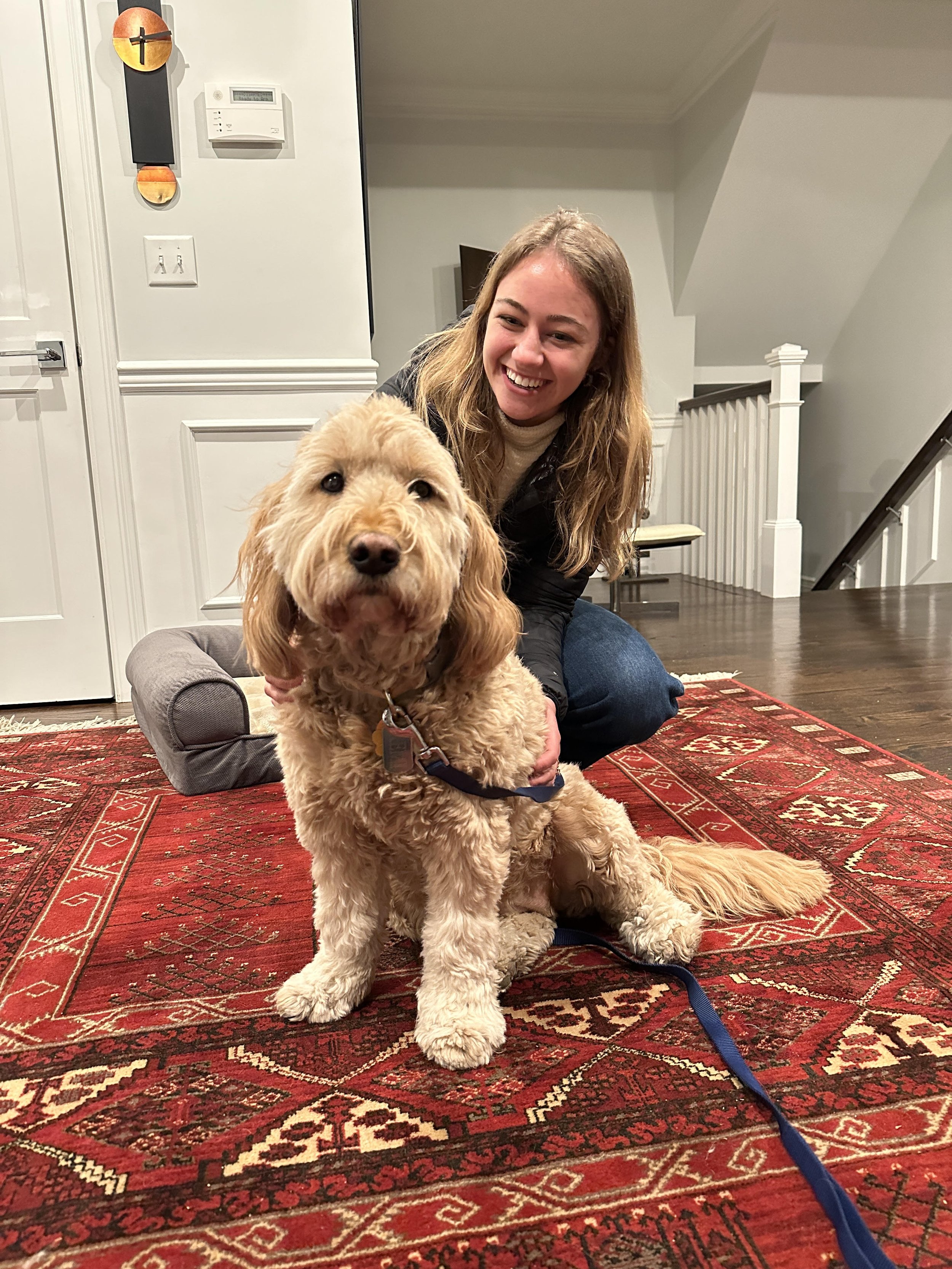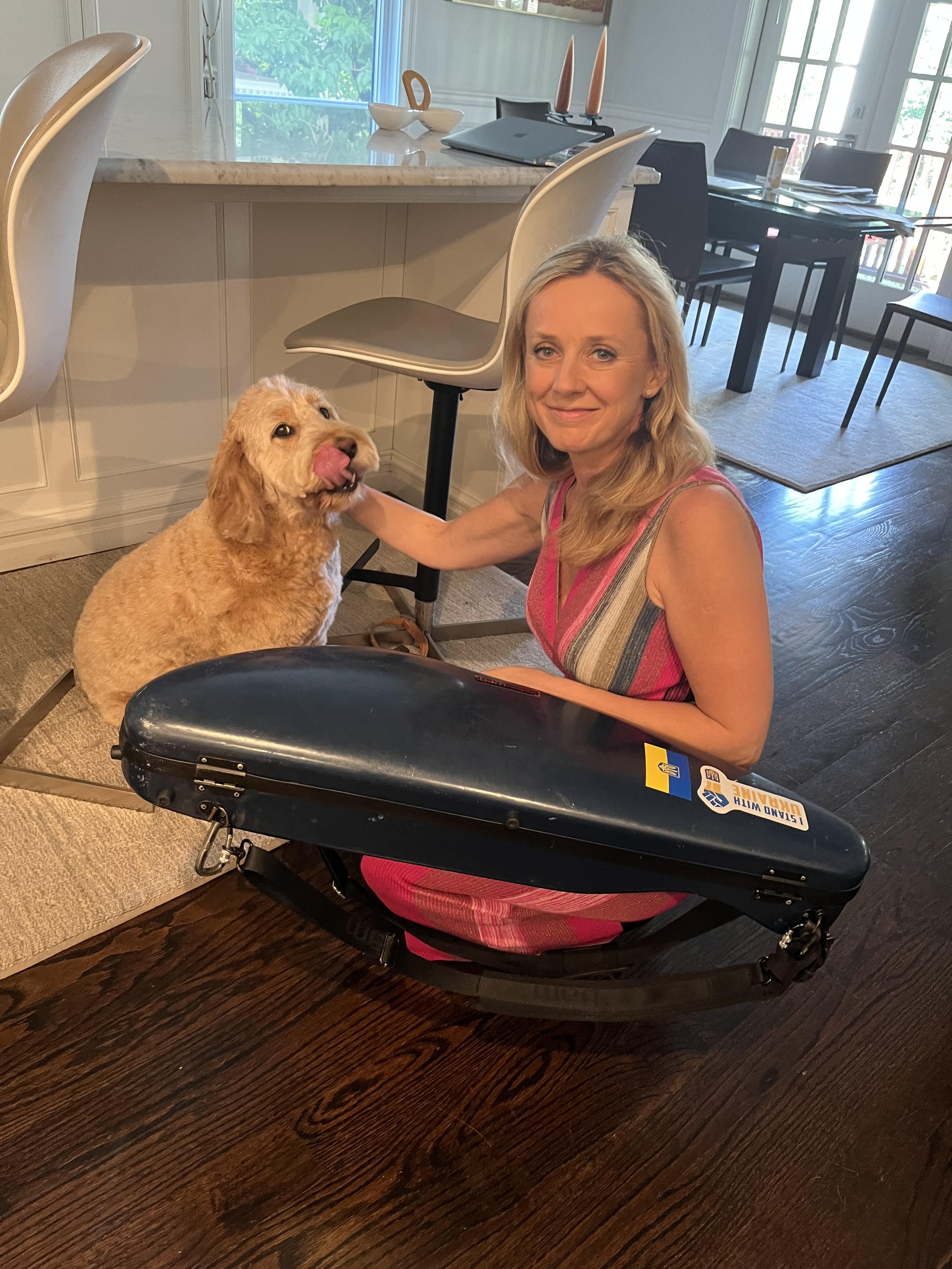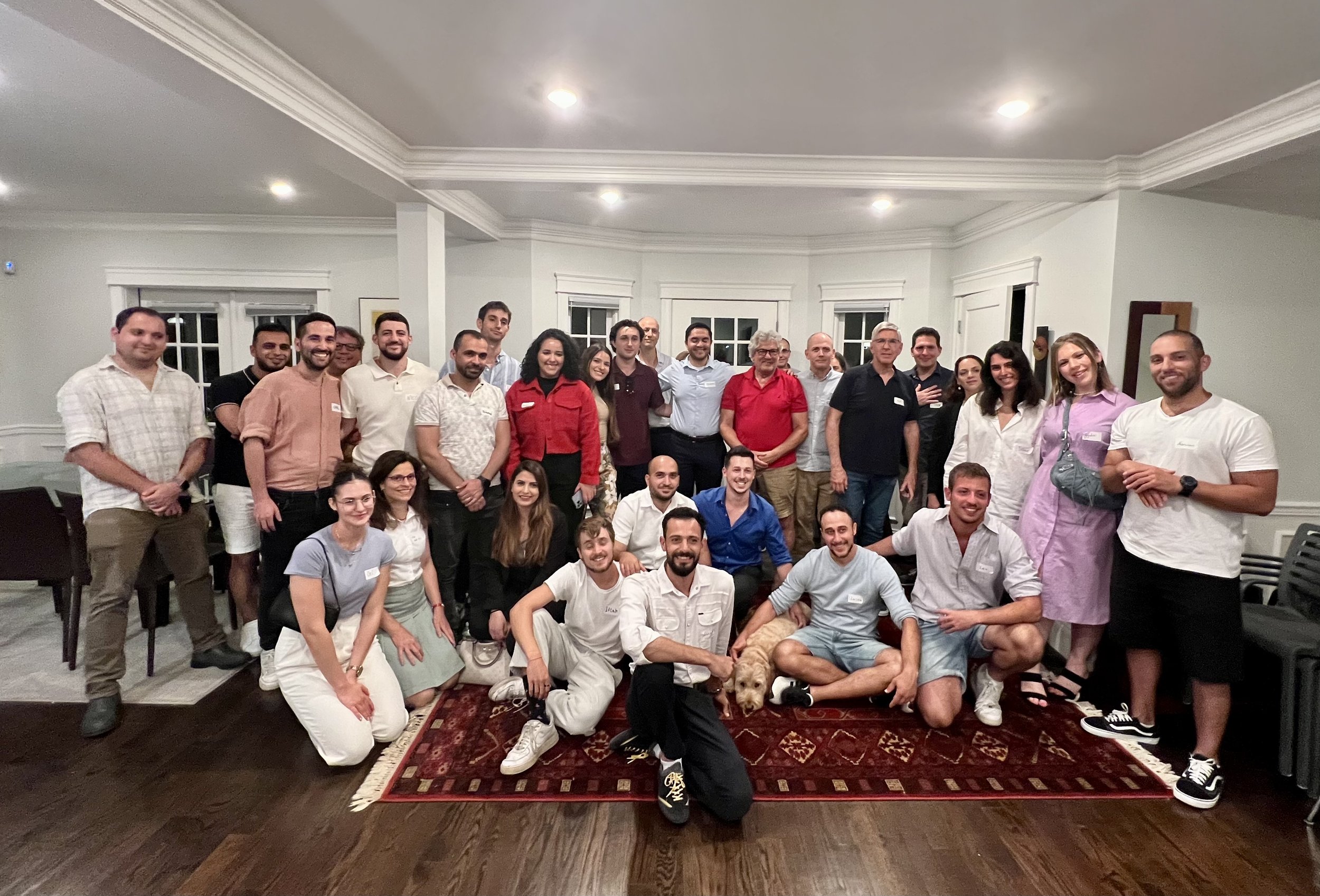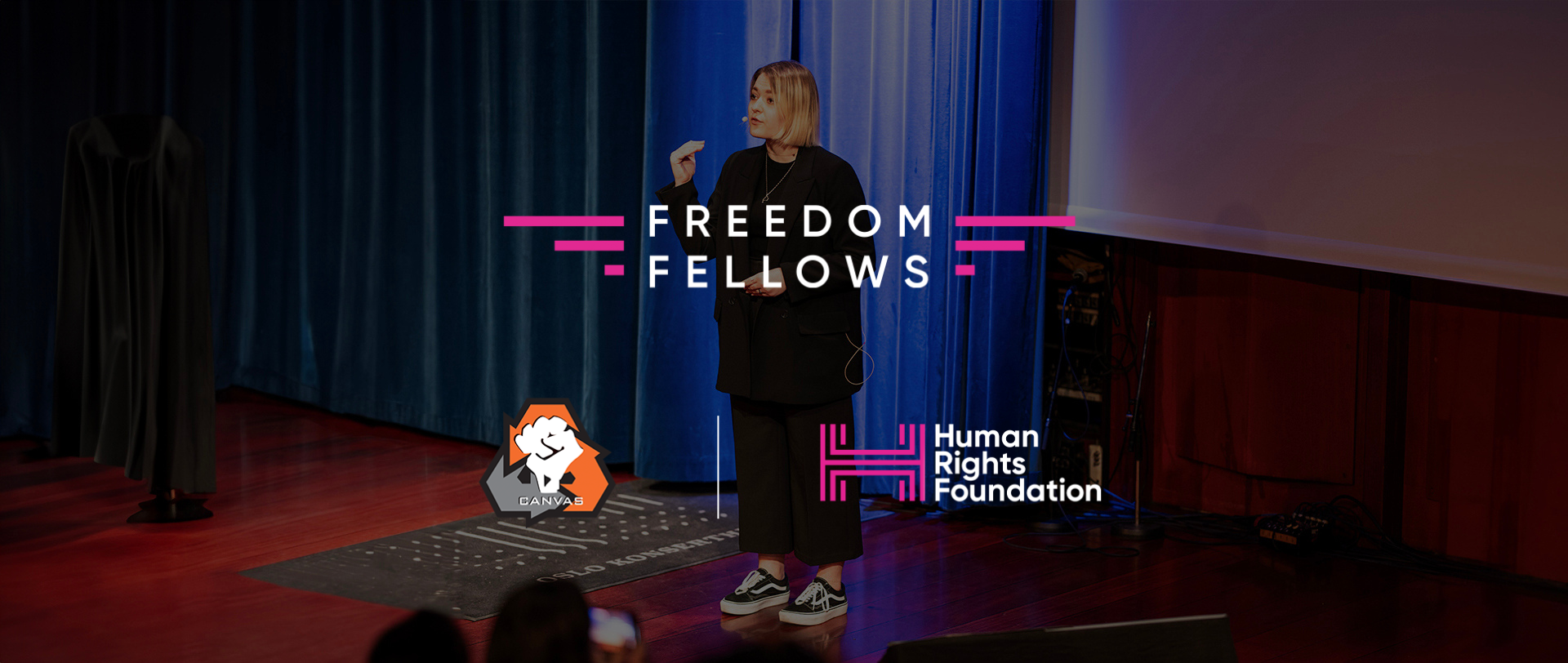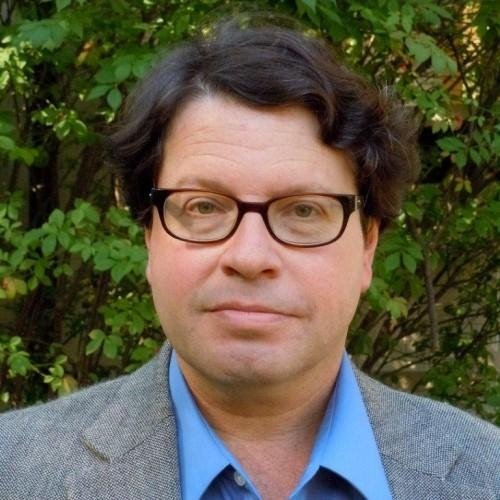Remi
Welcome to some very recent Remi experiences on Corn Hill Beach in Truro. The first picture you will notice has a bespeckled pup. Why? Because my dear friend, Michael Maso, brought me up on a missing part of my childhood, namely, the cartoon Mr. Peabody and Sherman. When you read the description below, you will see how apt the relationship is. There is no doubt that Remi, whom I obviously adore, is like Mr. Peabody, the far more sagacious partner in the relationship. I hope you enjoy her, and delight in her, as I do, as my entire family does. Whenever I am stressed, she is empathically at my side, and regardless of what side of the bed I wake up on each morning, our early morning runs on the beach put me in the right frame of mind to meet the challenges of the day. This posting will be updated more frequently than any other! This entry hopefully brings a smile to your face and makes it conclusive that this is not a LinkedIn, but a beloved community.
To those of you who really know me, you will recognize how accurate this is!
Mr. Peabody, the most accomplished canine in the world, and his boy, Sherman, use a time machine called the Wabac to embark on outrageous adventures. However, when Sherman takes the Wabac without permission to impress his friend Penny, he accidentally rips a hole in the universe and causes havoc with world history. It's up to Mr. Peabody to mount a rescue and prevent the past, present and future from being permanently altered.
Martin O'Brien
Martin O’Brien is the Founder and Executive Director of the Social Change Initiative (SCI), an international not-for-profit organization based in Belfast. SCI works to help activists and donors to be more effective agents for change. Its work is focused on the themes of peacebuilding, equality, human rights and migration.
Prior to joining SCI, Martin worked for 11 years at the Atlantic Philanthropies where he was Senior Vice President and managed the foundation’s global grant-making programs on Health, Ageing, Children and Youth, and Reconciliation and Human Rights. He led the planning process for the conclusion of Atlantic’s programmatic grant-making.
Martin is also a seasoned activist for social change having worked for over 30 years in the peace and human rights movement in Northern Ireland. He led the Committee on the Administration of Justice (CAJ) which campaigned locally and internationally to advance human rights in Northern Ireland. He was centrally involved in the efforts to secure strong measures to protect human rights and equality in the Good Friday/Belfast Agreement.
Martin’s work as an effective advocate for human rights and peace has been internationally recognized with a number of awards and honors. He has extensive experience of high-impact philanthropy, fundraising, human rights, advocacy, peacebuilding, and conflict resolution. His work as an activist and as a strategic grantmaker has given him a particular insight into how change happens and the role that philanthropy can play.
I have the privilege of knowing Martin who I have heard of for a very long time from Padraig O’Malley, a common friend, in the wonderful weave of Convisero. I was actually introduced to him by Adi Nassar, the program manager of Amal-Tikva. I was introduced to Adi by his predecessor Amitai Abuozaglo. This came about initially by my meeting Amitai as my Harvard student when I interviewed and successfully nominated him for the Oslo Scholars Program. It is clear that Martin will be a tremendous asset for the course I will teach on mediation, negotiation and conflict resolution in the spring of 2024 at Sai University. We are intent on trying to bring Indian and Pakistani students together to begin to think about divided societies and in particular the future of Kashmir.
Jim Gilbert
Jim grew up in Buenos Aires but spent many summers in Cape Cod where he became one of the first surfers on the East Coast. His career in journalism started at the Provincetown Advocate in Cape Cod, and continued in San Juan, Newport, and Ft. Lauderdale, focusing on maritime issues. Jim was editor-in-chief of the publishing company Seven Seas Press but later became fascinated by the beauty, mechanics, and people of superyachts (yachts over 130’), so he founded the magazine ShowBoats International to cover them. He was the founder, editor-in-chief, and eventual owner of the magazine, which received some of the highest praise in the superyacht industry.
While working at ShowBoats International, Jim founded and worked for 24 years for the charity The International SeaKeepers Society, which has done incredible work in protecting the marine environment. He engaged readers as supporters of the charity, raising over $10 million to fund this work, with over 100 members paying $250K each to join by the time he sold the magazine in 2005.
Jim also wrote The Admiral, a climate change-inspired novel, a fantasy book telling the story of a mid-ocean community living the realities of climate change. He then became president of Aquos Yachts and Christensen Shipyard, both yacht construction companies. He now lives and continues to fish in Cape Cod. Jim studied sociology at Occidental College as an undergraduate and completed three years of interdisciplinary postgraduate studies at UMass, Amherst.
I met Jim simply as a fisherman, or more appropriately, The Truro Fisherman, through Convisero mentor Ted Kurland. We had a number of lovely conversations about boats and fishing, mind you I never had a fishing rod in my hand, but he intrigued me. But now, reviewing this bio of a new friend you will see why. He will make an ideal addition to our Global Maritime Accord and has agreed to advise students on maritime issues.
EARLY MOMENTS FROM 2018 TO 2020 AND THE MOST RECENT CONVISERO GATHERING iN 2023
The first Lumay and Padden Murphy where I married two of my former students is an exemplar of the most appropriate intimate meeting of the community.
A Moment in Time and A Convisero retrospective provide detailed explanations of the linkages the community was enacting in 2020.
Mae-ling Lokko
Mae-ling Lokko is an architectural scientist, designer and educator from Ghana and the Philippines who works with agrowaste and renewable biobased materials. Through her work, Lokko explores themes of “generative justice” through the development of new models of distributed production and collaboration.
Lokko is an Assistant Professor at Yale University’s School of Architecture (YSoA) . Her research at Yale’s Center for Ecosystems in Architecture focuses on ecological design, integrated material life cycle design and the broad development and evaluation of renewable biobased materials. Her practice Willow Technologies, Ltd. based in Accra, Ghana that upcycles agrowaste into affordable biobased building materials and for water quality treatment applications. Her work was nominated for the Visible Award 2019, Royal Academy Dorfman Award 2020 and she was a finalist for the Hublot Design Prize 2019.
Lokko’s recent works have been exhibited at major museums globally including the Museum of Modern Art, New York; Stedelijk Museum, Netherlands; Museum of the Future, Dubai; Z33 House for Contemporary Art, Design and Architecture, Belgium; Triennale Milano, Italy, Somerset House, London, Nobel Prize Museum, Stockholm; and the Luma Foundation, Arles. Her work has been featured in ICON Magazine, Blueprint, Wallpaper, MOLD Magazine, Frieze Magazine, RIBA Journal, DOMUS, DAMN Magazine and other global design publications.
I first met Sherman when I was a sophomore and joined the second class of Synaptic Scholars at Tufts University. Sherm created and inspired a rich, vibrant community to pursue their passions in unconventional ways, through connections inside and outside the school and through a range of friendships. I found a community of sorts there at the time.
Sherman has remained the kind of life long mentor I have always been grateful to have, unwavering in his support and fascination and bravery (and inspiring bravery in others) in all the ways that count. And I’m so grateful for spirit of intellectual diversity that grew during my years in Sherm’s orbit.
As Mae-ling indicated, I met her first as a young, yet having already lived in Africa, Asia, Europe, the Middle East, and the United States, a worldly sophisticated sophomore at Tufts. I had initiated Synaptic Scholars the year before with the blessings of then President Larry Bacow and my Provost Jamshed Bharuch. They were very encouraging of the effort to give meaning to interdisciplinary and multidisciplinary inquiry, terms that I found both intriguing and yet often described in a very manner. I thought the best way to exemplify the concept would be to find and encourage students whose intellectual thirst could not be slacked by majoring and minoring in the usual manner.
I chose the first cohort of intriguing students and gave them the mandate to experiment “at the margins,” a space that Larry described as a fulcrum of the most interesting ideas, and what Jamshed termed the “frontiers of knowledge.” I helped the first class tap the second class, witnessing the interviews, consulting with the students, empowered with the full freedom to choose their cohort.
Mae-ling was an overwhelming, unanimous choice. She thoughtfully embraced intellectual intricacy and understood the nuances of self-identity. She was a precious avatar of the vision I had. She was thoroughly passionate about architecture and especially was fascinated by traditional and vernacular Asian and African design. Her involvement in Synaptics allowed her to concentrate on reviving a landscape design program in her Ghanaian boarding school that she termed "The Uzuri Project" (named after the Swahili word for beauty.)
In her being and action, Mae-ling exemplified the complexity of hybridity and cosmopolitanism. With confidence, grace and strength, she understood how to embrace her identity, transcend boundaries and borders, and navigate and embrace multiple cultural worlds and communities. President of the Tufts African Students Organization, Mae-ling was also active with the Asian-American Society, Tufts' Emerging Black Leadership Symposium, and the University's multiracial organization Loving drama and performance arts, she was active in both Tufts Irish Dance Club and the Filipino Cultural Society. Her concerns for humanity transcended Tufts and she was active in the organization Emergency, centered on quality health care for victims of poverty and war.
It was clear to me that Mae-ling was happiest with a tangible, visceral engagement with creation. I remember her design plans to redo the landscaping and installations of the wide expanse of Tufts Capen House’s grounds. I knew she was destined for a distinctive distinguished career, one fusing theory and practice, that already her trajectory at Yale and beyond speaks to.
Anyone familiar with Mae-ling’s work would find it distinctly strikingly eclectic, path-breaking and precedent-setting. Mae-ling is insightful, thoughtful and fearless. She robustly embodies the word innovation. Her work is breathtaking and the essence of the concept of sustainability. Her intellect is matched by a joyous, humane buoyancy, immediately evident in the warmth and radiance of her personality. I happily remember her trenchent commentaries and thoughtful academic presentations, marked by verve, enthusiasm and often unchecked excitement. When people say of a person, they "light up a room," it is Mae-ling they are talking about.
Most Recent Convisero Gathering
A few weeks ago, I hosted 45 people at my Brookline home in support of my friend, Northeastern University Professor, Amir Grinstein, a Convisero mentor, who created a startup initiative of Israeli and Palestinian young entrepreneurs called 50:50. It has just formally joined forced with Tel Aviv University entrepreneurial program, jumpTAU.
Many positive outcomes. I linked one of their initiatives, an orthodontics project, to Tufts Dental School and Samia Abdul Aziz, a graduate of the school, a former EPIIC student and to my personal dentist, an Emirati national, Abdulla Alghfeli. Another, a negotiation civil rights initiative to the Abraham Initiative, whose executive directors I will host in my home in mid November. I had invited 15 of our community to advise and interact with them and Amir is now friends with another Convisero mentor, Bhashkar Chakravorti.
One serendipitous meeting that evening now has linked 50:50 member Mohammed El-Khatib,a Reichman University undergraduate directing their Pugwash chapter with one of my current interns, David Rubin, a Dartmouth senior, who, at my instigation, has created a thriving Pugwashian chapter at his college. Together they will work with SaiU's Indian chapter that I created with my TA Jyotsna Badrinarayanan.
In 2016, I made a pledge before the hundreds of alumni who came to our 30th anniversary gala and to the directors Belfer Center for Technology and Global Affairs at Harvard to revive Pugwash. I now sit on the external advisory board for the ISYP's executive board. Talia Weiss, who I recruited when she was an MIT student, now a Ph.D. student at Yale, has just been named ISYP director. Details can be found on Trebuchet’s nonproliferation efforts
Lantos Foundation To Honor Canadian Human Rights Lawyer And Former Justice Minister Irwin Cotler With 2023 Lantos Human Rights Prize
Lantos Foundation To Honor Canadian Human Rights Lawyer And Former Justice Minister Irwin Cotler With 2023 Lantos Human Rights Prize
Media contact:
Chelsea Hedquist
press@lantosfoundation.org
August 8, 2023 – The Lantos Foundation for Human Rights & Justice today announced that it will award the 2023 Lantos Human Rights Prize, its highest human rights honor, to distinguished Canadian human rights lawyer and former Minister of Justice Irwin Cotler. He will receive the award at a ceremony taking place on October 24, in Washington, DC. Professor Cotler, who was an admired friend and contemporary of the Foundation’s namesake Congressman Tom Lantos, will join the distinguished ranks of Lantos Prize laureates, including His Holiness the Dalai Lama, the late Professor Elie Wiesel, former Secretary of State Hillary Clinton, founder of the global Magnitsky movement Bill Browder, and NBA athlete turned activist Enes Kanter Freedom – among other notable figures.
“I am deeply humbled and honored to be counted among the ranks of Lantos Prize laureates,” said Professor Cotler. “It is especially moving for me as I had the pleasure to know and work with Congressman Lantos – a towering figure in the world of human rights who has inspired my own work – and to work in common cause with the Lantos Foundation for Human Rights & Justice.”
For nearly five decades, Professor Cotler has been one of the world’s foremost human rights lawyers and has served as counsel to numerous high-profile prisoners of conscience, including Soviet “refusenik” Natan Sharansky, anti-apartheid activist and former President of South Africa Nelson Mandela, Chinese Nobel Peace Laureate Liu Xiaobo, imprisoned Saudi blogger Raif Badawi, Venezuelan political prisoner Leopoldo Lopez, and many others. He developed a unique advocacy model that helped win freedom for many of these prisoners, earning him the well-deserved monikers of “Freedom’s Counsel” and “Counsel for the Oppressed”. This model helps guide the work of advocacy groups and human rights organizations around the world – including the Lantos Foundation, which relied heavily on Professor Cotler’s model during nearly three years of advocacy leading up to the release of 2011 Lantos Prize laureate Paul Rusesabagina.
Today, Professor Colter serves as International Chair of the Raoul Wallenberg Centre for Human Rights, the organization he founded to carry forward his lifelong mission of pursuing justice for all people and advancing human rights for the vulnerable and oppressed. In 2020, he was appointed by Canadian Prime Minister Justice Trudeau to serve as Canada’s first ever Special Envoy on Preserving Holocaust Remembrance and Combatting Antisemitism, and he is a powerful voice speaking out against the rising tide of global antisemitism in its many forms. He is also an Emeritus Professor of Law at McGill University.
“The Lantos Foundation is deeply honored to bestow the Lantos Human Rights Prize on a person of Professor Cotler’s stature in the human rights movement – he is, quite simply, a giant in the human rights world,” said Dr. Katrina Lantos Swett, President of the Lantos Foundation. “Over the past many decades when individuals around the world have been denied their fundamental human rights, Professor Cotler has been there on the front lines, defending those who have been left defenseless. Though he is modest to a fault, he has had an outsized and undeniable impact on human rights throughout the world. Despots and dictators surely tremble when they hear that Irwin Cotler has taken up the causes of their political prisoners because there is no one more effective than he at winning freedom for the unjustly imprisoned. I know my late father Congressman Tom Lantos would be delighted to see such a worthy recipient receive the Prize named in his honor.”
Professor Cotler has also had a distinguished political career, as a former Minister of Justice, Attorney General and longtime Member of Parliament in Canada. Throughout his political career, Professor Cotler’s commitment to human rights has always been at the forefront: he initiated Canada’s first-ever law on human trafficking; issued Canada’s first National Justice Initiative Against Racism and Hate; overturned more wrongful convictions in a single year than any prior Minister of Justice; and consistently pushed the Canadian government to make the pursuit of international justice a government priority.
Both Professor Cotler and Congressman Lantos were deeply inspired by the example of Raoul Wallenberg, the Swedish diplomat who saved tens of thousands of Hungarian Jews during the Holocaust. Both looked to his example to motivate their own work on human rights and justice. Congressman Lantos’ first act when elected to the U.S. Congress was to introduce a bill conferring honorary American citizenship on Raoul Wallenberg. This act inspired Professor Cotler and others to push for Canadian honorary citizenship for Wallenberg, as well, which became a reality only a few years after Congressman Lantos’ bill was signed into law.
The 2023 Lantos Prize will be conferred at an invitation only ceremony in DC. More details about the ceremony will be forthcoming for members of the media. The Lantos Human Rights Prize has been awarded annually since 2009 (see a full list of laureates here). It is given to a human rights champion or champions each year to help draw attention to human rights violations around the world and to encourage governments to make human rights a priority on equal footing with other policy decisions. The Lantos Prize is named for Congressman Tom Lantos, who co-founded the Congressional Human Rights Caucus – which was reconstituted as the Tom Lantos Human Rights Commission following his passing.
###
About the Lantos Foundation for Human Rights & Justice: The Lantos Foundation was established in 2008 to carry forward the legacy of Congressman Tom Lantos, the only Holocaust survivor ever elected to the U.S. Congress and a leading human rights champion. The Foundation works with a range of partners and often in cooperation with the U.S. Government on issues that span the globe. The Foundation’s key areas of focus include human rights issues related to religious freedom, rule of law, internet freedom and activist art. The Foundation also administers the Lantos Congressional Fellows Program, supports human rights advocates, activists and artists through its Front Line Fund grant program, and awards the annual Lantos Human Rights Prize to honor and bring attention to heroes of the human rights movement. Past recipients of the Prize include His Holiness the Dalai Lama, Professor Elie Wiesel, the real-life hero of Hotel Rwanda Paul Rusesabagina, Israeli President Shimon Peres, Iraqi Parliamentarian Vian Dakhil, Hong Kong Democracy activist Joshua Wong, Bill Browder, the driving force behind the global Magnitsky movement, founder of the Equal Justice Initiative Bryan Stevenson, among others.
Meet the New Class of HRF Freedom Fellows
Introducing the New Class of HRF Freedom FellowsThe Human Rights Foundation’s (HRF) Freedom Fellowship is a unique one-year program in partnership with CANVAS that gives human rights advocates, social entrepreneurs, and nonprofit leaders from authoritarian regimes the opportunity to increase the impact of their work. Through mentorship and hands-on seminars, fellows develop critical skills and join a growing community of human rights activists.
Meet the 2023-24 Freedom Fellows
Joey Siu is a Hong Kong activist based in Washington, D.C, who played a vital role in Hong Kong’s 2019 pro-democracy protests. She organized city-wide protests and co-founded a student advocacy coalition. After fleeing in 2020, she served as an advisor to the Inter-Parliamentary Alliance on China and a policy advisor to Hong Kong Watch. Siu is also a dedicated advocate for the Tibetan, Uyghur, and other communities oppressed by the Chinese Community Party. In exile, she’s created a cross-movement coalition with young activists and successful advocacy initiatives, including the #NoBeijing2022 campaign.
Ramy Essam, an Egyptian rock artist and human rights defender, is considered one of the most prominent figures of the Egyptian Revolution. He began as a voice on the streets of Egypt and has risen to the international stage, with viral hits and winning several awards. His music, inspired by rock and hip-hop, has an Egyptian flavor, and he sings in both Egyptian Arabic and English. Essam uses his music platform to promote social justice and human rights worldwide.
Zineb El Rhazoui is a Moroccan-French human rights activist and journalist. She published several articles on religious minorities in the independent publication Le Journal Hebdomadaire, which the Moroccan government banned in 2010. She co-founded the pro-democracy, pro-secularism movement MALI before joining the satirical magazine Charlie Hebdo in 2011. After the Arab Spring, during which she was a spokesperson for Morocco’s February 20 Movement, she was forced into exile in Slovenia. She continues speaking out against religious extremism and supporting women's rights under theocratic regimes.
Raphael Adebayo is a Nigerian human rights activist, author, and co-founder of the #EndSARS-ReformPoliceNG movement. In 2020, Adebayo helped coordinate the #EndSARS protests against police brutality in Nigeria. He documented attacks by hired thugs and the use of excessive force by security agencies. He also exposed the government officials who recruited these thugs to brutally attack peaceful protesters. His involvement in the protests resulted in serious threats against him, forcing him into exile, where he has continued his activism.
Babur Ilchi is a program manager for the Uyghur Human Rights Project and a former program director for the Campaign for Uyghurs. Since he was a student at the University of Calgary, Ilchi has been involved in grassroots and student activism, program management, and corporate accountability campaigning, especially concerning Uyghur forced labor supply chains. He has been interviewed by several major news outlets, including BBC, ITV News, and the Globe & Mail.
Yunier Suárez is a Cuban human rights defender and artist. Through theater, he has exposed the mechanisms of repression and violence employed by the Cuban regime. After several years of political threats and censorship by the Cuban Ministry of Culture, he resettled in Spain, where he remains an active member of the citizen platform Cuba Decide, voicing grievances and advocating for systemic and democratic change in Cuba.
To learn more about the program, and to witness the testimonials of previous Freedom Fellows, watch the program recap video below:
If you are interested in learning more about or donating to the Freedom Fellowship, we encourage you to contact Jhanisse Vaca-Daza at jhanisse@hrf.org.
Lucy Kaplansky
Lucy started out singing in Chicago folk music clubs as a teenager. Then, barely out of high school, Lucy Kaplansky took off for New York City. There she found a fertile community of songwriters and performers—Suzanne Vega, Steve Forbert, The Roches, and others. With a beautiful flair for harmony, Lucy was everyone’s favorite singing partner, but most often she found herself singing as a duo with Shawn Colvin. People envisioned big things for them; in fact, The New York Times said it was “easy to predict stardom for her.” But then Lucy dropped it all.
Convinced that her calling was in another direction, Lucy left the musical fast track to pursue a doctorate in Clinical Psychology. Upon completing her degree, Dr. Kaplansky took a job at a New York hospital working with chronically mentally ill adults, and also started a private practice. Yet she continued to sing. Lucy was often pulled back into the studio by her friends, (who now had contracts with record labels) wanting her to sing on their albums. She harmonized on Colvin’s Grammy-winning "Steady On," and on Nanci Griffith’s "Lone Star State of Mind" and "Little Love Affairs." She also landed soundtrack credits, singing with Suzanne Vega on "Pretty in Pink" and with Griffith on "The Firm," and several commercial credits as well—including “The Heartbeat of America” for Chevrolet.
Then Shawn Colvin—who was itching to produce a record—hooked up with Lucy, her ex-singing partner. They went into the studio, and when Lucy’s solo tapes got into the hands of Bob Feldman, president of Red House Records, he was blown away. Suddenly, Lucy was back in the music business. She signed with Red House Records and started playing gigs. Red House released The Tide in 1994 to rave reviews, and within six months Lucy signed with a major booking agency—Fleming Artists—and began touring so much it required leaving her two psychologist positions behind.
Lucy’s second album, Flesh and Bone (1996), emphasized her development as a gifted songsmith. Then Lucy’s success took flight with back-to-back hit albums Ten Year Night (1999) and Every Single Day (2001). Both received the AFIM award (Association For Independent Music) for Best Pop Album of the year. Lucy also contributed her story to a unique book, SOLO: Women Singer- Songwriters in Their Own Words, which includes some of the best known women on the music scene today: Ani DiFranco, Shawn Colvin, Sheryl Crow, Jewel, Sarah McLachlan and others. She was also featured in Lipshtick, a collection of essays by NPR commentator Gwen Macsai, published in the fall of 1999.
In 1998 Lucy teamed with Dar Williams and Richard Shindell to form supergroup Cry Cry Cry, and recorded some of their favorite songs written by other artists. The resulting album, Cry Cry Cry (which The New Yorker dubbed “a collection of lovely harmonizing and pure emotion,” and to which Entertainment Weekly gave an “A” rating), was an astonishing success in stores and on radio. A national tour of sold-out concerts by the trio served to introduce Lucy’s luminous voice to a new audience. In 2017 and 2018, the trio celebrated their 20th anniversary with a sold out national tour and the release of their first recording in 20 years, a single of Jump Little Children's "Cathedrals."
The Red Thread followed the commercial and critical hit Every Single Day, weaving together themes of motherhood, home and the family with stunning production. Lucy’s 2007 release Over the Hills as well as her 2012 release Reunion explored universal themes of love, joy, loss, and dreams for the future, through reflections on family.
In 2009 and 2010 Lucy had two songs commissioned by the international cosmetics company La Prairie to help launch their new fragrance line “Life Threads.” As part of that marketing campaign, Lucy was featured in a music video, as well in as in a variety of marketing appearances and materials, including a feature story in “Women’s Wear Daily.”
In 2010 Lucy joined up with acclaimed singer-songwriters John Gorka and Eliza Gilkyson to record an album as part of new folk super-group Red Horse. Awash in gorgeous harmonies and stripped down production, the album features the singers performing each other’s songs. Red Horse received rave reviews and was the number one album on Folk Radio for several months in 2010. Since the album’s release, the trio were interviewed on NPR’s “Weekend Edition” with Liane Hansen and appeared on NPR’s “Mountain Stage.”
In 2011 Lucy released an EP, Kaplansky Sings Kaplansky, featuring songs written by her father, famed University of Chicago mathematician Irving Kaplansky, including live performances of the two of them performing together in California. This is Lucy’s first venture into 1940’s style swing, reminiscent of the work of Kaplansky’s former student Tom Lehrer.
Lucy's September 2018 release, Everyday Street, is a stunning collection of songs weaving stories of joy, friendship, family, loss and discovery. It is somewhat of a departure sonically: stripped down, spontaneous, acoustic, with the feel of one of her concerts. The songs were recorded over four days with her long-time collaborator Duke Levine on acoustic guitar, electric guitar, mandola, National guitar, and octave mandolin, and Lucy on acoustic guitar, mandolin and piano. These are genuine performances, many were captured in one take.
The opening song, “Old Friends,” a duet with Lucy's long-time friend Shawn Colvin, is a reflection on their friendship and on their times together in the early days of the Greenwich Village folk scene. “Keeping Time,” with Richard Shindell on harmony, is from her vantage point as a mother sharing her neighborhood’s rhythms, albeit from a distance, with the late actor and father of three Philip Seymour Hoffman. “Janie’s Waltz” is about the beauty and grace of an ordinary day. The everyday streets of her long-time home, Greenwich Village in New York City, are woven throughout the recording. There are also four cover songs which have all been fan favorites from her shows, including Bruce Springsteen’s “Thunder Road,” Nanci Griffith’s “I Wish it Would Rain,” and the traditional Scottish song “Loch Lomond.” Finally, there is a re-imagined version of the title song of her first album, The Tide.
Lucy's version of Roxy Music's "More than This" was featured on a Spotify playlist, "Your Favorite Coffeehouse," and to date her recording has over 11.5 million streams. She has appeared on the CBS Morning Show, NPR’s Weekend and Morning Editions and All Things Considered, Mountain Stage, and West Coast Live. Her voice has remained in high demand by her peers. Lucy's song “Guilty as Sin” was featured in the NBC television show Ed. In addition, she can be heard on releases by Bryan Ferry and Nanci Griffith, and on the Greg Brown tribute album Going Driftless (also featuring Ani Difranco, Iris Dement, Mary Chapin Carpenter, Gillian Welch, Lucinda Williams and others).
Lucy continues to tour and receive airplay both nationally and internationally. Her CD Ten Year Night is the #1 selling album of all time at Red House Records.
I first met Lucy in an encounter on one of Truro's magnificent bayside beaches, Corn Hill It's a dog mecca. I was returning from its breakwater with my pup, Remi, and from a distance I saw a lovely lady making seemingly deliberate strides towards me, towed forward by an energetic beagle. I remember looking about, wondering if there was someone interesting behind me. But it was me she was searching for. Her query when she came within earshot was something insistent, like, "Is the University of Chicago's Lab School yours?"
It was. I had left it on the sand at the entry of the beach. I was at the Lab for a year, (1968), hungry for a teaching, and mentoring experience, while I was pursuing a MA on their Committee of International Relations at the University of Chicago. Lucy explained that she had gone to school there.
It was a fun, animated conversation, and a delightfully serendipitous meeting. Lucy was without affect, or any guile.
We continued to meet with our dog group, and if I remember correctly, our initial conversations were concentrated on US domestic politics and the threat of Trumpism. And playful comments on my bizarre vocabulary.
It was only later that I realized she was an extraordinarily accomplished and noted songwriter and modern folk singer.
She is as modest and unaffected as any person might be. It is so easy to care about this person who deflects any pretense of celebrity.
From assertive virtuoso guitar playing to gentle mandolin and piano arrangements, her eclectic, nuanced music is compelling, sensitive and heartfelt, her harmonies, beautiful. Lucy's thoughtful lyrics are always thought provoking, be they poignantly political, insightful commentaries on life, insightful personal remembrances, humorous asides, or caring lullabies.
Having been privileged to witness her performances, her rapport with, and respect for her audience, is remarkable
I am an unabashed fan. Her friendship, and that of her superbly talented husband,Rick, often her writing collaborator, is priceless.
I always find it amusing that I'm a good friend of the daughter of an internationally renowned professor of mathematics , "Kap!" Her performances of his A Song About Pi, always evokes smiles and laughter when I play it for my friends.
And the sweatshirt in question was actually a gift from one of my wonderful alumni, Sarah Arkin, another Convisero mentor, who had also attended the Lab School.
James G. Hershberg
James G. Hershberg, professor of history and international affairs at George Washington University in Washington, D.C., is an historian of the cold war and the nuclear arms race. His first book, James B. Conant: Harvard to Hiroshima and the Making of the Nuclear Age (NY: Knopf, 1993; pb: Stanford University Press, 1995; e-book: Plunkett Lake Press, 2018), dealt with a key figure in the early atomic story: a scientist and Harvard University president who became a key science and then nuclear adviser to Presidents Roosevelt and Truman during and after World War II.
In that capacity, he was involved in the decisions to build and use the atomic bomb, and worked closely with Oppenheimer on various topics covered in the movie: the Manhattan Project (including the dramatic Trinity Test), the (failed) efforts to control atomic energy and prevent a postwar US-Soviet nuclear arms race, the opposition to constructing thermonuclear weapons (the hydrogen bomb), and the impact of McCarthyism that led to the removal of Oppenheimer's security clearance. The book resulted from an undergraduate thesis and doctoral dissertation advised by Martin J. Sherwin, whose Pulitzer Prize-winning biography of Oppenheimer (co-authored with Kai Bird), American Prometheus, inspired the "Oppenheimer" movie.
Hershberg has directed the Cold War International History Project (CWIHP) of the Woodrow Wilson International Center for Scholars, worked in dozens of archives around the world (Western, Eastern, and Southern), and written extensively on the Cuban Missile Crisis and Vietnam War, among other subjects.
Ira M. Herman, Ph.D.
Dr Herman is a key opinion leader and global consultant for industry, pharma, foundations and academia, offering innovative solutions for therapeutic angiogenic and anti-angiogenesis therapeutics development, the creation of next generation diagnostics as well as therapeutics for molecular and cellular medicines for personalized, regenerative medicine. He is currently the Senior Director of Biological Engineering at Precision Healing, Inc.
For the entirety of his discovery- and innovation-based career, and since his days in training at Tulane University, Harvard Medical School and The Johns Hopkins University School of Medicine, Dr. Herman has been devoted to understanding the basic mechanisms that control wound healing. As a global thought leader, Dr. Herman has made several seminal contributions to our understanding the molecular mechanisms that control post-injury responses, while unveiling central factors, key signaling networks and molecular complexes responsible for regulating host reparative responses and wound resolution. These fundamental insights have given way to innovative strategies as well as several inventions aimed at characterizing wound state as well as controlling the conversion of non-healing wounds into those capable of closure. Dr Herman has also delivered key advances for molecular and cell-based ocular anti-angiogenic therapeutics aiming to ameliorate or prevent the progression of diabetic retinopathy and age-related macular degeneration. As a lead innovator and key opinion leader, Dr. Herman has chaired international meetings on regenerative medicine while serving on innumerable grant review panels, editorial boards for high-impact journals and scientific advisory boards for biotechnology companies and pharma. He is the recipient of numerous awards, published 100s of peer-reviewed scientific publications and is named inventor on many US and international patents, which describe advanced diagnostics and therapeutics for next generation, precision health care. While at Tufts University School of Medicine, Dr. Herman rapidly rose through the academic ranks to become tenured and distinguished professor of Cellular, Molecular and Chemical Biology, while holding appointments of comparable rank in the departments of Ophthalmology, Medicine and Biomedical Engineering at Tufts University and Tufts Medical Center. At the time he was recruited by Lumicell, Inc. to lead its newly-founded wound care division, now Precision Healing, Inc.
I've known Ira for decades; he served admirably on my Institute's Board as a senior faculty member. He was involved in a variety of special projects, perhaps the most interesting was when he accompanied me to an ALLIES gathering at a US Naval Academy in Annapolis, where he presented his remarkable work on wound recovery. He subsequently hosted an ALLIES delegation of midshipmen in the Mama Kin club of Aerosmith fame. Ira and I share a deep passion for eclectic music, with Ira I think specializing in Rock 'n Roll. Our most distinct bond, of course, is our shared love of his daughter Elizabeth "Biz '' Herman, one of my extraordinary former students. Our most distinct initial interaction was over a controversy that was quickly resolved over Biz's photographic skills, now frequently joked about in our community of VII photographers who admire her greatly.
The Elephant in the Room
We, academics and other public figures from Israel/Palestine and abroad, call attention to the direct link between Israel’s recent attack on the judiciary and its illegal occupation of millions of Palestinians in the Occupied Palestinian Territories. Palestinian people lack almost all basic rights, including the right to vote and protest. They face constant violence: this year alone, Israeli forces have killed over 190 Palestinians in the West Bank and Gaza and demolished over 590 structures. Settler vigilantes burn, loot, and kill with impunity.
Without equal rights for all, whether in one state, two states, or in some other political framework, there is always a danger of dictatorship. There cannot be democracy for Jews in Israel as long as Palestinians live under a regime of apartheid, as Israeli legal experts have described it. Indeed, the ultimate purpose of the judicial overhaul is to tighten restrictions on Gaza, deprive Palestinians of equal rights both beyond the Green Line and within it, annex more land, and ethnically cleanse all territories under Israeli rule of their Palestinian population. The problems did not start with the current radical government: Jewish supremacism has been growing for years and was enshrined in law by the 2018 Nation State Law.
American Jews have long been at the forefront of social justice causes, from racial equality to abortion rights, but have paid insufficient attention to the elephant in the room: Israel’s long-standing occupation that, we repeat, has yielded a regime of apartheid. As Israel has grown more right-wing and come under the spell of the current government’s messianic, homophobic, and misogynistic agenda, young American Jews have grown more and more alienated from it. Meanwhile, American Jewish billionaire funders help support the Israeli far right.
In this moment of urgency and also possibility for change, we call on leaders of North American Jewry - foundation leaders, scholars, rabbis, educators - to
1. Support the Israeli protest movement, yet call on it to embrace equality for Jews and Palestinians within the Green Line and in the OPT.
2. Support human rights organizations which defend Palestinians and provide real-time information on the lived reality of occupation and apartheid.
3. Commit to overhaul educational norms and curricula for Jewish children and youth in order to provide a more honest appraisal of Israel’s past and present.
4. Demand from elected leaders in the United States that they help end the occupation, restrict American military aid from being used in the Occupied Palestinian Territories, and end Israeli impunity in the UN and other international organizations.
Mara James
Mara was a student in the IGL’s EPIIC program from 2010 – 2011 which focused on South Asia: Conflict, Culture, Complexity and Change. The experience was one of the most formative of her time at Tufts. During the program, she led a team research trip to the National Security Archives in Washington DC to analyze US declassified documents from the Soviet invasion of Afghanistan to draw historical comparisons and lessons as President Obama announced his troop surge.
After graduation, Mara spent time interning for a member of parliament in the United Kingdom, working for the Amy Biehl Foundation in the Nyanga township of Cape Town, and teaching English to Buddhist monks in Laos. Upon her return to the US, she worked in research and communications for a multi-strategy hedge fund in New York, where she focused on geopolitical risk for the commodities and portfolio protection teams. She left to study for her MBA in global business from NYU, spending the summer between her first and second year at MassChallenge, the global non-profit accelerator, in Mexico City.
Following NYU, Mara spent three years managing the communications, impact and investor reporting for Small Enterprise Assistance Funds, an impact investing fund manager supporting SMEs in frontier and emerging markets. She currently lives in London, where she works for Brunswick Group as a strategic advisor to clients ranging from social housing companies to large renewable energy companies. During the interview process for her current role, she stumbled upon a fellow EPIIC alum at the organization and reached out to her. The fellow alum replied within minutes, offering to jump on a call and commenting that their connection was “kismet” – a true testament to the power of Sherman and the IGL to bring people together.
The first thing I remember about Mara that reveals her character and persona is the broadest, most infectious smile that anyone could rely on to lighten and illuminate the dark spaces, the unsafe spaces, which we need to continue to tread in this world, places that Mara intentionally revealed to herself. She intimately explored an extraordinary breadth of fraught international and domestic issues, never considering them “foreign” issues, but important spaces to witness, contextualize, and mitigate. Above, she has described her remarkable work on many continents. One of the most important lessons I tried to impart on my Institute students beyond understanding perpetrators and being empathic to victims, was to avoid the role of bystander. Mara knew of this instinctively. She had the fortune to be part of an extraordinary family I got to know, who hosted and supported me in demanding times. They introduced our Institute to important human resources from American Vietnamese experts to the professionals of Search for Common Ground and the National Security Archive, which reinforced our efforts. A woman of great intelligence, determination, and sensitivity, Mara continues to introduce such people to our community and enrich our lives. Hopefully Convisero reciprocates. The woman that Mara wrote of is none other than Maria Figureoa Kupcu, yet another wonderful alumni and seasoned strategic and risk analysis professional. I asked her, along with Jennifer Selendy(Trebuchet’s secretary) to join the Institute’s board and ultimately they were its last co directors.
Dr. Eugene B. Kogan
Dr. Eugene B. Kogan is the founder & managing director of Kogan Global Advisory, a negotiation strategy and executive coaching practice. Dr. Kogan has helped more than 2,000 executives and their teams worldwide to successfully navigate high-uncertainty environments for over 15 years. As an Executive Coach at Harvard Business School, he counseled mayors of major European cities on innovative approaches to team management and external communication amid COVID and unprecedented migration challenges. He has likewise delivered value for private-sector clients in diverse industries—from luxury goods to logistics—through corporate training on cutting-edge leadership strategies amid supply-chain disruptions.
Certified in mediation by Harvard Law School, Dr. Kogan co-authored the book, Mediation: Negotiation by Other Moves (Wiley 2021), and helped a healthcare startup navigate delicate conversations among senior team members. A strategic counselor with uncanny sensibility for human relationships, he continues coaching senior leaders & CEOs in public & healthcare sectors on how to navigate power dynamics in matrixed environments.
Dr. Kogan designs and delivers top-rated executive programs, drawing on his award-winning thought leadership on power dynamics in negotiation and leadership. His ability to translate academic insights into actionable solutions and distill implications of global developments has received frequent accolades. Private- and public-sector executives from Europe, Middle East, Asia, and North America have benefitted from his dynamic keynotes and strategy sessions on such subjects as “Using Power: Five Mindsets of Effective Leaders,” “Leadership and Influence,” and “Advanced Negotiation Skills.”
An agile relationship-builder, Dr. Kogan has conferred with America’s top diplomats from Henry Kissinger to Rex Tillerson. A first-generation immigrant, he has lived overseas for 17 years, developing the cultural acumen to manage diverse constituencies. Dr. Kogan has native fluency in English and Russian, as well as a working proficiency in French. His Brandeis University Ph.D. thesis won the Howard Raiffa Award for the Best Doctoral Paper in Negotiation from Harvard Law School’s Program on Negotiation. Dr. Kogan is a dedicated mentor to young professionals.
Vladimir Kara-Murza Stands Tall Against Putin's Kangaroo Court
On Monday, a closed court in Moscow rejected the appeal of Russian opposition leader, democracy advocate, and longtime HRF community member Vladimir Kara-Murza. Arrested in April 2022, Kara-Murza was handed a 25-year prison sentence by a kangaroo court the following year on fabricated charges of “high treason,” “spreading deliberately false information” about Russia’s armed forces and participating in the actions of an “undesirable” organization.
Kara-Murza's real offense has been denouncing Vladimir Putin’s war crimes and crimes against humanity in Ukraine and the Kremlin's ongoing crackdown on Russian democrats. Such bold moves have long made Kara-Murza a target of Putin's dictatorship; he’s survived two near-fatal poisoning attempts by Russian officials since 2015.
In true heroic defiance, he gave these last words in Moscow’s First Court of Appeal of General Jurisdiction on July 31:Throughout this process — first in the Moscow City Court, now here in the Court of Appeal — a very strange feeling has not left me. Judicial procedures, by their very nature, must be linked in some way to the law. But everything that happens to me has nothing to do with the law, except perhaps in the sense of the complete opposite. The law — both Russian and international — prohibits the waging of aggressive war. But for more than 16 months, the man who calls himself the president of my country has been waging a brutal, unprovoked, aggressive war against a neighboring country: kills its citizens, bombs its cities, seizes its territories.
The law — both Russian and international — prohibits attacks on civilians and civilian objects. But in the 16 months of [Vladimir] Putin's aggression in Ukraine, tens of thousands of civilians were killed and wounded, and thousand hospitals, schools, and houses. The law — both Russian and international — prohibits the propaganda of war. But war propaganda is all I hear from morning till night on the TV that plays in my prison cell.
Today, in our country, not those who wage this criminal war, but those who oppose it, are judged. Journalists who tell the truth. Artists who put up anti-war stickers. Priests who remind of the commandment "Thou shalt not kill." Teachers who call a spade a spade. Parents whose children draw anti-war pictures. Deputies who allow themselves to doubt the appropriateness of children's competitions when children are being killed in a neighboring country.
Or, as in my case, politicians who openly speak out against this war and against this regime. Twenty-five years for five public performances. As the head of my convoy in the Moscow City Court joked: “It looks like he did a good job.”
All this has already happened in our country. In 1968, participants in a demonstration on Red Square against the invasion of Czechoslovakia were sentenced to camps and exile, and in 1980 Academician Sakharov was exiled to the closed city of Gorky for speaking out against the war in Afghanistan.
But very little time passed — not by historical standards, but by human standards — and the president of Russia in Prague condemned that occupation and laid flowers at the memorial to its victims, and the highest legislative body of our country recognized the war in Afghanistan as deserving of moral and political condemnation.
The same will happen with the current war in Ukraine, and much sooner than it may seem to those who unleashed it. Because in addition to legal laws, there are laws of history, and no one has yet been able to cancel them.
And then the real criminals will be judged, including those whose arrest warrants have already been issued by the International Criminal Court. As you know, war crimes have no statute of limitations.
To those who organized my and other show trials of opponents of the war; by trying to present opponents of the authorities as “traitors to the Motherland”; for those who are so nostalgic for the Soviet system, I would advise you to remember how it ended. All systems based on lies and violence end the same way.Almost as powerful as those words was this courtroom display of courage.
The Human Rights Foundation (HRF) is a nonpartisan nonprofit organization that promotes and protects human rights globally, with a focus on closed societies.
For media inquiries or interview requests, please contact media@hrf.org.
Lucas Arthur
Lucas Arthur is a Technical Associate in the MIT Laboratory for Nuclear Security and Policy. He is from just outside of Palmer, Alaska, and received his S.B. degree in physics with a minor in political science from MIT in 2021. Lucas is interested in the security ramifications of emerging technologies and how to mitigate existential threats. He works primarily on arms control and disarmament, ballistic missile guidance, and advanced sensing, but maintains a wider interest in the intersection of information theory, computation, and physical systems. He is also the content advisor for the Alice Kimball Smith Series on science, technology, ethics, and global affairs at Yale University. When not working on research, he can often be found hiking, climbing, or trail running.
I had the great pleasure of meeting Lucas Arthur through a wonderful common friend, Talia Weiss, who remains the prototype, as Lucas does, of people whom I admire, for having both extraordinary quantitative and qualitative skills. Lucas is the communicative glue between Sandenna McMaster and myself, both having hailed from the same town in Alaska, and both having a passion for the outdoors. I had the pleasure of introducing Lucas Arthur to David Rubin, the founding president of Dartmouth College’s Pugwash, where Lucas lectured on his current research and modernizing the US Nuclear Triad. Lucas currently works at the MIT Laboratory for Nuclear Security and Policy, headed by Scott Kemp, making Lucas and his work an invaluable asset for young Pugwashians. I introduced Lucas to Professor Dick Lanza in our efforts to stimulate and create an MIT Pugwash chapter.
Tyler Peppel
I’m an entrepreneur, educator and researcher currently working with a number of teams and projects aimed at helping society through artificial intelligence technologies.
My interest in AI was triggered in the mid-1980’s when I snuck into Marvin Minsky’s MIT class lectures. Minsky was an effervescent lecturer and I was captivated by his ideas about “machines that can understand stories.”
It was also at MIT that I first met fellow Conviserians Sherman Teichman and Peter Droege, who have since shared my decades-long interest in the impact of technology on social networking, public policy, and learning.
I received a Master’s from the Media Lab at MIT, where my research focused on the transition from analog to digital media and the ways digital technologies influence how we make and share messages.
From MIT I moved to Apple, where I spent 5 years leading a new product team tasked with evolving the Macintosh operating system from support of static text and still images to dynamic streaming of interactive video, audio, and animation. These capabilities enabled new “media rich” applications like video editing, music production, and interactive learning.
I’m now an adjunct faculty member at New York University, teaching “AI and Communication” about the impact of AI on the creation and sharing of information, beliefs, art, and ideas. I also serve as the CEO of Tickr, a startup building AI software tools and advising organizations on beneficial uses of AI.
Some current projects:
Wordloop uses Natural Language Processing to analyze language samples and use the resulting outputs to enhance existing language. For example, Wordloop can be used to analyze an individual primary-school student’s writing and use that analysis to refactor existing curricula and assignments into a hyper-personalized 1:1 curriculum tailored to that student’s cognitive abilities, language skills, and personal communication style.
Top Model is an online public forum where anyone can upload AI-driven predictive models for competition and scoring in real time. The models predict causality and outcomes across topics like climate change, financial resilience, social stability, and public health. Ratings of model accuracy will be displayed live, 24/7, to a global audience. Model-makers retain ownership of their models and the competition is open to all. Top Model combines the power of AI-driven predictive analytics with crowdsourcing to drive discovery of new solutions to critical global issues.
StoryLab (in conjunction with the Covid 19 Impact Project at New York University). StoryLab applies Natural Language Processing techniques to oral histories, from the earliest examples to the present. Our goal is to “mine” the oral histories to discover how social, cultural, political, and economic circumstances of individual lives have impacted overall well-being, both during and after crisis events. Our hope is to then use our findings to inform policy making in ways that increase social equity and resilience in future crisis situations (pandemics, natural disasters, and economic dislocation) with a particular focus on at-risk and disadvantaged groups.
Prosocial Partners is an informal group of researchers, designers, artists, and technologists that pursue projects of interest relating to socially beneficial uses of AI. Currently, we are developing the “Prosocial Prize” for essays envisioning a realistic and positive future for AI technology in healthcare, economics, public policy, and the arts.
We are constantly on the lookout for high-impact projects. Feel free to contact me at tyler@prosocial.partners.
Ellen Rovner
Ellen is the founder and director of the Chelsea Gateway Project, an ensemble of community-based initiatives celebrating Chelsea’s rich immigrant history and building on the city’s enormous potential as a showplace for the American immigrant experience. As part of this ongoing project, Ellen initiated and conducts Chelsea Jewish Tours, a series of walking day trips recognizing and reflecting on Chelsea’s extensive Jewish immigrant history and its legacy for a community that has recently become home to Hispanic, African, and Asian immigrants. In addition, for Chelsea Prospers, the city’s neighborhood vitality initiative, Ellen has fostered cross-cultural connections by developing online neighborhood, food, and storytelling excursions. Ellen is the executive producer, writer, and narrator of Chelsea, the Jewish Years, a documentary film featuring oral histories from Chelsea’s twentieth-century Jewish community.
Ellen has taught food anthropology and ethnography courses as a visiting professor in Boston University’s Liberal Arts and Gastronomy master’s program. In addition, as a visiting scholar in Brandeis University’s Women’s Studies Research Center, Ellen researched women’s food voices as vehicles for social action; published online essays and commentaries concerning food, families, class, and ethnicity; developed a dissertation-based research manuscript; and
mentored Brandeis University undergraduates through the school’s Student Scholar Program. Ellen has also taught courses in cultural anthropology, food and culture, power and violence, gender studies, and religion as a Brandeis University teaching fellow and university instructor.
Ellen has organized, designed, coordinated, and consulted on social action and community development programs and museum-style exhibits for Temple Emmanuel of Chelsea, the Chelsea Collaborative, Chelsea Prospers, Chelsea Greenroots, Chelsea Community Connections, Healthy Chelsea, Florence, Cohen, and Irwin Chafetz Assisted Living, Brookline Community Mental Health Center, Newton’s Paula Brody and Family Water-Immersion Education Center, Jewish Historical Society of the North Shore, and Temple Israel of Boston.
Ellen has published articles and essays on food, gender, conflict, and culture for the Visions Magazine, Jewish Journal, Huffington Post, Brandeis Initiative on Aging, and Greater Boston Anthropology Consortium. She also wrote a monthly Boston Herald food and lifestyles column. In addition, Ellen has lectured on food, families, class, and culture at numerous North Shore and Greater Boston Jewish institutions and professional anthropological societies in Boston, Chicago, San Francisco, and the U.K.
Dr. Rovner holds a Bachelor of Arts in political science and a Master of Education in counseling and human services from Boston University, a Master of Arts in anthropology and women’s studies, and a Doctor of Philosophy in cultural anthropology from Brandeis University.
Tamy Guberek
Tamy Guberek’s career as a human rights advocate spans the non-profit sector, academia, and the technology industry.
She is currently a Senior Researcher in the Privacy and Data Practices organization at Meta. She leads research to help the company align with people’s online privacy expectations, meet regulatory requirements, and reduce risks of harm, especially among populations with heightened risks.
Tamy began her career conducting high-impact research in service of justice via the EPIIC seminar at Tufts University in 1999. After an EPIIC-sponsored research trip the then-newly established International Criminal Tribunal for the former Yugoslavia (ICTY), Tamy co-led a national survey of NGOs perceptions of the court in post-war Bosnia and Herzegovina. The research uncovered how the vacuum in outreach by the ICTY was being filled by misinformation, exacerbating the ethnic and political tensions in a process that claimed to individualize responsibility and promote reconciliation.
Between 2004 and 2010, Tamy served as Latin America Coordinator for the Human Right Data Analysis Group (HRDAG), using digital security tools, survey methodology, and applied data science to shed light on the magnitude and patterns of human rights abuses in Colombia, Guatemala and other countries.
Tamy earned her Ph.D at the University of Michigan’s School of Information. Her doctoral work focused on the impact of communicating uncertainty about data to decision-makers, and the online privacy concerns and behaviors of vulnerable communities.
She also has a M.A. in World History from Columbia University, a M.Sc. in International History from the London School of Economics, and a B.A. in International Relations and Peace & Justice Studies from Tufts University.
Institute for Nonviolence - Chicago
Time for a wellness check-in.
Last year we launched our new Behavioral Health & Wellness initiative focused on healing our healers. Our goal is to increase staff wellness and resiliency against the impact of trauma which would also increase their capacity to provide wellness services directly to participants.
We are now past our second year of implementation and have some great progress to report. Since 2021 we,Created an internal Wellness Committee to research and vet therapeutic resources. As a result, we have already held two very successful Wellness Fairs and begun offering wellness activities to staff each month.Certified 40% of the staff in our Cognitive Behavioral Intervention (CBI) curriculum and added CBI to two of our programs, fusing coping and trauma resiliency skills with the principles of nonviolence.Learned a lot about what our staff experience on and off the job regarding trauma experience and resiliency. Consequently, we have begun to make changes to policies and added critical support services for staff.Get more details about how we strive to heal our healers, our process, and our progress at nonviolencechicago.org/Healing.
Case Manager, Larrecio Gamble, experiencing Reiki on July 11, 2023.
Reiki was introduced to staff at our first Wellness Fair in October 2022. Now it has become a staff favorite.

